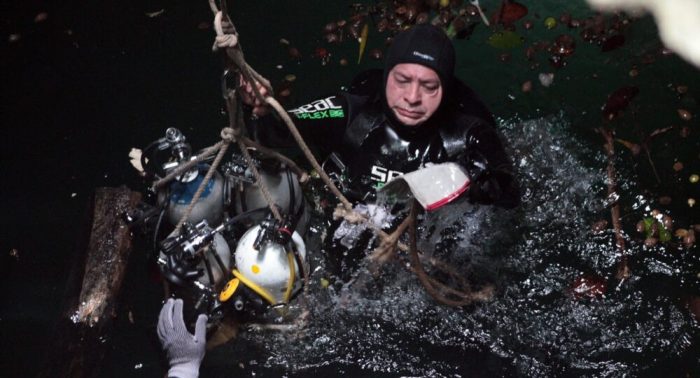A Megalodon is a pre-historic giant shark known to be a great predator of all seas, large and voracious, which is surprising that it is found in a Yucatan cenote
Mérida, Yucatán, (October 18, 2021).- The Sustainable Development Secretariat (SDS) reported that 169 cenotes in Yucatán are used for tourism purposes and that they hold archaeological and paleontological treasures, which have been discovered recently, including cave paintings and the tooth of a Megalodon.
A megalodon is an extinct animal that during ancient times was a great predator of all the seas of the world. Large and voracious, it could be identified or defined as a huge white shark, which is surprising that it is found in a cenote in Yucatan.
In the framework of the presentation of the sanitation that Fundación Bepensa and the company Beta Procesos will carry out in the Siete Bocas cenote of the Sucupo community, in the municipality of Tizimín, Sayda Rodríguez Gómez, head of the SDS, assured that the tourism activity of Yucatán is looking towards the cenotes.
He specified that next Monday, within the framework of the Environmental Protection Day, the agency will present the discovery of some cave paintings that appeared during the cleaning of a cenote carried out by the Bepensa Foundation, where a megalodon tooth stands out.
She also stated that other discoveries have been made in three other cenotes such as pottery from pre-Hispanic times.
It should be noted that using drones and state-of-the-art technology, researchers from CICY, UNAM, and Cinvestav estimated that there are about 8,000 cenotes in Yucatan, of which 3,160 are located and most are in inaccessible areas.
In addition to the sanitation, conservation, and registration program, the Secretariat for Sustainable Development will shortly restart the program for measuring the water quality of the cenotes open to the public to know the degree of contamination of these aquifers.
“This program was going to start when the COVID-19 pandemic began and was suspended, but now they will return to the subject. One of the intentions is to grant certification of the water quality of the cenotes and the first one to be analyzed will be the water from the Yokdzonot cenote ”, said Rodríguez Gómez.
TYT Newsroom



